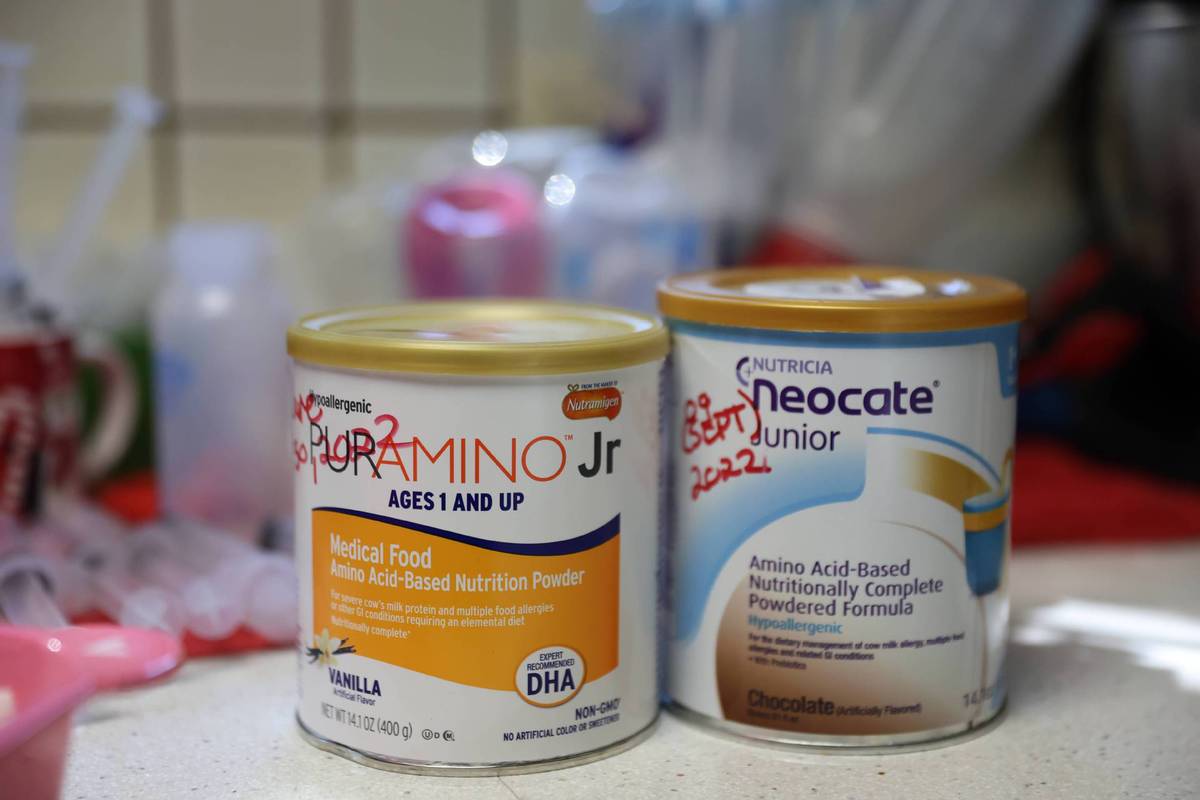美媒:美國“奶粉荒”持續(xù),貿(mào)易保護反噬自身 Why America’s baby formula crisis is an entirely self-inflicted problem
中國日報網(wǎng) 2022-05-23 16:54

2022年5月份,在雅培奶粉事件、供應(yīng)鏈問題和通貨膨脹等多重因素作用下,美國奶粉危機愈演愈烈。美國商業(yè)雜志《快公司》5月18日報道分析,美國為維護市場控制地位、嚴格控制配方奶粉進口而高筑關(guān)稅壁壘,加劇了奶粉荒短時間難以緩解的局面。全美范圍內(nèi)的嬰兒配方奶粉短缺,是美國大搞貿(mào)易保護主義、最終破壞本國產(chǎn)業(yè)鏈供應(yīng)鏈穩(wěn)定的又一例證。

以下為文章摘編:
In the two years since COVID first arrived in the US, Americans have had to get used to things being out of stock. Refrigerators, stoves, washers—at various points, global supply-chain issues have meant that each of these has been tough to come by. But while those stock-outs may have been annoying, Americans today are dealing with a shortage that’s actually serious: a dearth of infant formula. In the first week of May, the national out-of-stock rate for infant formula was 43%, and there’s no sign that things have improved since. And this supply-chain problem is different from those earlier ones in two ways. First, formula is not a product you can afford to wait for. (Babies need to be fed!) Second, this problem is largely self-inflicted.
自美國首次發(fā)現(xiàn)新冠病毒的兩年間,美國人不得不習(xí)慣缺貨。冰箱、爐灶、洗衣機都出現(xiàn)過缺貨,全球供應(yīng)鏈問題意味著這些產(chǎn)品都很難到貨。盡管這些商品缺貨可能令人惱火,但今天的美國人正在應(yīng)對一個很嚴重的短缺問題:嬰兒配方奶粉缺貨。在5月的第一周,嬰兒配方奶粉的全美缺貨率為43%,此后沒有任何有所改善的跡象。嬰兒奶粉供應(yīng)問題與之前的供應(yīng)鏈問題有兩個區(qū)別。首先,配方奶粉是等不了的產(chǎn)品。(嬰兒需要喂奶!)其次,這個問題主要是美國“咎由自取”。
The proximate cause of the shortage was the shutdown of Abbott Laboratories’s formula factory in Sturgis, Michigan, and the company’s voluntary recall of powder-formula products made there, after FDA inspectors found a bacteria called Cronobacter inside the plant. (Months earlier, four infants who consumed formula from the factory had become ill with Cronobacter infections, and two had died, though Abbott says that the illnesses were not caused by consuming its products.) But the reason that shutdown was so consequential is that we’ve created a system in which almost all the formula consumed in the US is made by a small number of companies in a small number of factories; taking just one of them offline has massive ripple effects across the economy. Parents in Canada and Europe aren’t having any trouble finding baby formula. It’s only American parents who have been left scrambling.
短缺的直接原因是雅培公司關(guān)閉了在密歇根州斯特吉斯的配方奶粉工廠,該公司在其工廠內(nèi)發(fā)現(xiàn)阪崎腸桿菌后,主動召回該工廠生產(chǎn)的配方奶粉產(chǎn)品。(幾個月前,四名食用該工廠配方奶粉的嬰兒感染了阪崎腸桿菌,兩名嬰兒死亡,不過雅培表示,這些疾病并非由食用其產(chǎn)品引起的。)但停產(chǎn)的影響之所以如此之大,是因為美國消費的幾乎所有配方奶粉都是由少數(shù)幾家公司在少數(shù)幾家工廠生產(chǎn)的;僅僅讓其中一個關(guān)閉就對整個經(jīng)濟造成大規(guī)模連鎖反應(yīng)。加拿大和歐洲的父母都沒有遇到嬰兒配方奶粉缺貨的問題。只有美國的父母在苦苦掙扎。
The numbers behind the crisis are pretty straightforward. Three companies—Abbott, Mead, and Nestle—account for the vast majority of formula sold in the US, and Abbott alone has more than 40% of the market—and 98% of the formula sold in the US is made in the US In other words, there is essentially no foreign competition. While countries like Germany and Switzerland have robust infant-formula industries, their companies sell almost nothing here directly.
這場危機背后的數(shù)字一目了然。雅培、美贊臣和雀巢三家公司占據(jù)了在美國銷售的絕大多數(shù)配方奶粉,僅雅培一家就擁有40%以上的市場份額,而在美國銷售的98%的配方奶粉是在美國制造的。換句話說,基本上沒有外國競爭。雖然德國和瑞士等國家擁有強大的嬰兒配方奶粉行業(yè),但它們的公司在美國幾乎沒有直接銷售任何產(chǎn)品。
That’s not because of a lack of demand for or interest in European baby formula; on the contrary, you can read myriad stories online about American parents going to great lengths to import formula made by companies like HiPP and Holle. Instead, there are no almost-legal imports from Europe because we have a tariff and regulatory system effectively designed to keep them out.
這并不是因為美國人對歐洲嬰兒配方奶粉缺乏需求或興趣;相反,你可以在網(wǎng)上讀到無數(shù)關(guān)于美國父母千方百計進口喜寶和泓樂等公司生產(chǎn)的配方奶粉的故事。但幾乎無法從歐洲合法進口,因為美國有一個有效的關(guān)稅和監(jiān)管體系阻止其進入。
That system starts with tariffs. Imported baby formula is subject to a tariff that’s typically 17.5%. On top of that, there’s an abstruse tariff-rate quota system, which means that once a certain amount of formula is imported from a country, it gets slapped with an extra tariff in addition to the original one. So any foreign-formula manufacturer who wants to sell its products in the US is going to be at a serious cost disadvantage to the Abbotts of the world.
這一體系從關(guān)稅開始。進口嬰兒配方奶粉的關(guān)稅通常為17.5%。除此之外,還有一套復(fù)雜的關(guān)稅率配額制度,這意味著一旦從一國進口的配方奶粉達到一定數(shù)量,就會在原來的配方奶粉關(guān)稅基礎(chǔ)上再加征額外關(guān)稅。因此,任何想在美國銷售其產(chǎn)品的外國配方奶粉制造商都將在成本上嚴重高于雅培。
To even get to that point, though, foreign-formula manufacturers have to satisfy not only the FDA’s nutritional requirements but also the agency’s surprisingly detailed labeling requirements. The FDA doesn’t officially approve infant formulas (the way it approves, say, drugs). But any product that doesn’t meet its rules—which include things like how ingredients should be listed on the label—can’t be sold in the US.
然而,為了進入美國市場,外國配方奶粉制造商不僅必須滿足美國食品藥品監(jiān)督管理局(FDA)的營養(yǎng)要求,還必須滿足其異常詳細的標(biāo)簽要求。FDA并不正式批準(zhǔn)嬰兒配方奶粉(就像它批準(zhǔn)藥物那樣)。但是,任何不符合其規(guī)定的產(chǎn)品(包括如何在標(biāo)簽上列出成分等)都不能在美國銷售。
None of this is because European infant formula doesn’t meet US standards: A 2019 study of 13 brands found that all of them met 15 out of 16 nutritional requirements. Indeed, the EU has its own nutritional requirements, which have actually been updated more frequently than those in the US.
這些限制都不是因為歐洲嬰兒配方奶粉不符合美國標(biāo)準(zhǔn):2019年對13個品牌的研究發(fā)現(xiàn),所有品牌都符合16個營養(yǎng)要求中的15個(由于配方的標(biāo)注方式,該研究的作者無法衡量這些品牌是否符合美國對亞油酸的要求標(biāo)準(zhǔn))。事實上,歐盟有自己的營養(yǎng)要求標(biāo)準(zhǔn),實際上比美國的營養(yǎng)要求更新得更頻繁。
The key here is that all these restrictions fit together to keep foreign producers out of the market. The economic incentives to go to all that trouble and expense are small because the tariffs and tariff-rate quotas limit their potential sales and profits. So they’ve understandably chosen not to enter the US market, leaving it to the big domestic players.
這里的關(guān)鍵是,所有這些限制都是為了阻止外國廠商進入美國市場。由于關(guān)稅和關(guān)稅配額限制了外國品牌潛在的銷售和利潤,為此付出的精力和成本能夠得到的經(jīng)濟回報很小。因此,可以理解他們選擇不進入美國市場,把市場留給了美國大公司。
It should be said that the motivation behind the FDA requirements is understandable. But in practical terms, the concern with safety has become a recipe for protecting the current oligopoly of formula manufacturers in the US And this is not a problem only in the infant-formula market. You can see a similar phenomenon at work in the generic-drug market, where FDA rules often mean that US consumers have only one choice of drug—and have to pay through the nose for it—even when there are multiple versions of the drug being made in Europe.
應(yīng)該說,F(xiàn)DA提出這些要求背后的動機是可以理解的。但實際上,對安全的擔(dān)憂已成為保護美國配方奶粉制造商當(dāng)前寡頭壟斷的一種方法,而這不僅僅是嬰兒配方奶粉市場的問題。你可以在非專利藥市場上看到類似的現(xiàn)象,F(xiàn)DA的規(guī)定通常意味著美國消費者只有一種藥物選擇,即使在歐洲生產(chǎn)多個版本的藥物,也必須為其支付高昂的費用。
In a broader sense, what the infant-formula crisis speaks to is the fact that setting up barriers that make it harder for Americans to buy stuff from the rest of the world—which is something Donald Trump did a lot of, and that Joe Biden has done little to roll back—makes the US economy more vulnerable, not less, to supply shocks. Free trade has become oddly unpopular in Washington, D.C. over the past six years. But the infant-formula market could use a lot more of it.
從更廣泛的意義上說,嬰兒配方奶粉危機說明了這樣一個事實:設(shè)置貿(mào)易障礙,使美國人更難從世界其他地方購買東西,這使得美國經(jīng)濟更容易受到供應(yīng)沖擊。為此唐納德·特朗普“功不可沒”,而喬·拜登對此幾乎沒有糾正。在過去六年中,自由貿(mào)易在華盛頓特區(qū)變得很不受歡迎。但嬰兒配方奶粉市場可以有更多的自由貿(mào)易。
來源:Fast Company
編輯:董靜

















 英語點津微信
英語點津微信 雙語小程序
雙語小程序